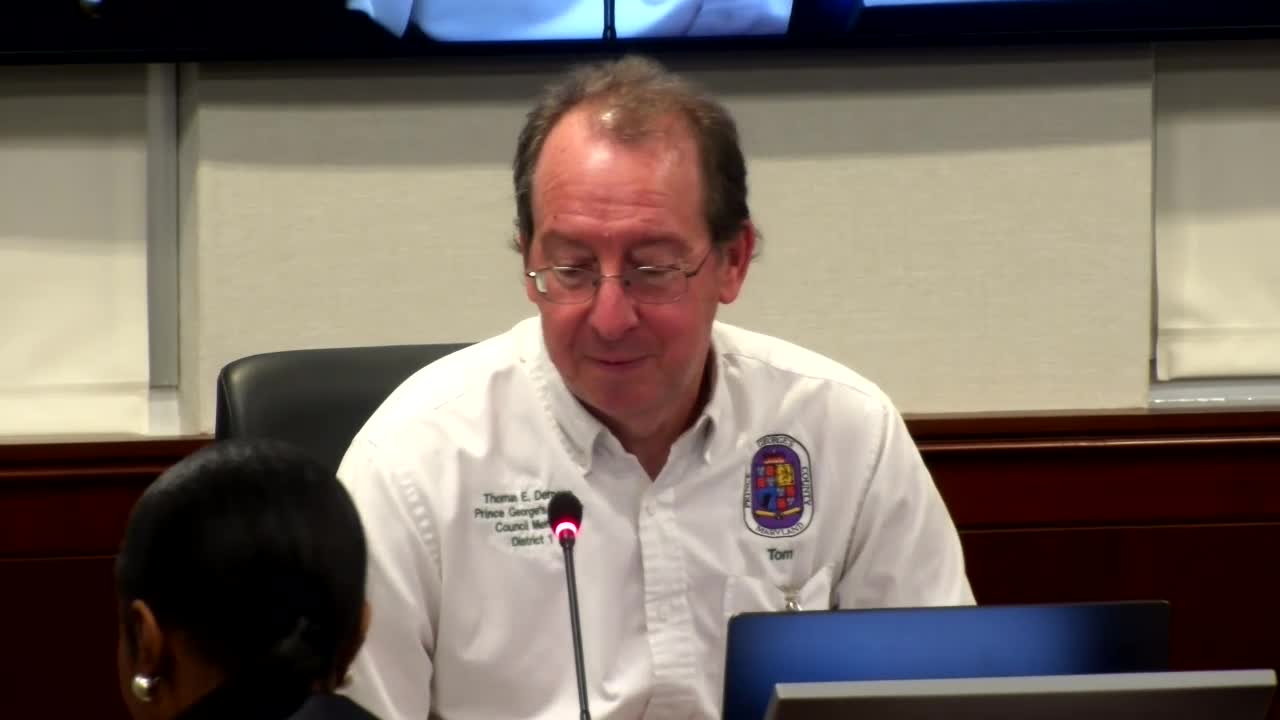County moves to implement administrative hearings for common ownership communities; council adopts interim rules framework
Get AI-powered insights, summaries, and transcripts
Subscribe
Summary
The Office of Community Relations briefed the committee on implementing an administrative hearing program for common ownership communities. The committee approved a resolution to begin promulgating rules and set a three-month education window before enforcement, with multiple amendments addressing portals, document access and transition timelines.
Prince George's County staff told the Planning, Housing and Development Committee on Oct. 16 that the Office of Community Relations is preparing to implement an administrative hearing program for common ownership communities (COCs), and the committee approved a resolution initiating rulemaking with amendments and a three-month education period before enforcement.
"This initiative reflects the county executive's steadfast commitment to enhancing the lives of COC unit is dedicated to ensuring that our communities thrive by providing essential education, training, and alternative dispute resolution services," Chanel Dickerson, Acting Director, Office of Community Relations, told the committee.
Michonne Hall, unit chief for the Common Ownership Communities unit, described the office's 5–6 program pillars: the Advantage online training program; a retooled community association registration; alternative dispute resolution; an expanded Commission on Common Ownership Communities (CCOC); and the new administrative hearings process. She said the commission will expand from nine to 15 voting members under recent state legislation, increasing residential seats to eight and professional seats to seven.
Hall summarized a phased implementation roadmap. "Phase 1... 0 to 3 months: planning and design," she said, listing stakeholder engagement with the office of law and information technology. Phase 2 (3 to 6 months) covers infrastructure development, staffing and case-management systems; Phase 3 is a pilot rollout in selected districts with listening sessions and a continuous improvement loop using SWOT analysis. Staff listed a program goal of resolving cases within 60 to 90 days where possible.
Several committee members and outside speakers backed the program but urged care in rule details and protections for small or volunteer-run associations. Delegate Marvin Holmes, a longtime state lawmaker on this issue and a member of the county's CCOC, told the committee the county program fills a statewide gap in guaranteed alternative dispute resolution: "Having a mandatory training within Prince George's County, I think, would solve most of the problems. Most of the problems," he said.
Management-industry representatives and commissioners supported transparency but raised concerns about operational detail and burden. Lashana Tillman, Division President at Century Management and a CCOC commissioner, recommended a six-month stakeholder work group and a model that uses registered management portals and county 311 integration rather than duplicative government systems. She told the committee: "If true oversight is the goal... the county could create a limited administrative account within each management company's portal, read only access to essential governance and compliance records."
The committee considered and adopted CR 85, a council resolution to begin promulgating rules and regulations for the COC program. Sponsor amendments replaced references to "homeowners association" with "common ownership communities," required electronic copies of executed contracts and governing documents to be maintained in management portals (with free online access where feasible), added transition timelines for compliance, and allowed for a pilot and education period. The committee voted 5–0 to move CR 85 favorably as amended.
Key policy details and safeguards inserted by committee action:
- Electronic portals and document access: Management companies and registered COCs must maintain electronic copies of executed contracts and governing documents and provide owner access; the committee directed that modifications must be uploaded and owners notified within 30 days. - Paper-copy fees: Physical copies up to 10 pages are to be provided free; a modest per-page fee (suggested 10¢) was discussed for longer printed requests. - Transition and enforcement: The committee added 30-day and 60-day buffers for remediation (30 days for associations with management companies; 60 days for self-managed communities), and it set a three-month education period after rule adoption before fines or penalties are enforced. - Commission and staffing: Staff noted the commission expansion (9 to 15 voting members) and that the office has budgeted for three new positions and is recruiting. Staff also requested dedicated OIT and Office of Law support for the program's case-management and legal templates.
Why it matters: The administrative hearing program is intended to provide an alternative to litigation, increase access to dispute resolution, strengthen transparency, reduce litigation costs and provide standardized remedies for violations within COCs — which include homeowners associations, condominiums and cooperative corporations.
What remains: Staff and the commission will finalize rule language and related technical guidance. Committee members and stakeholders asked for additional clarifications about privacy and redaction of vendor information, how to treat small or volunteer-run associations, election procedures and interactions with state law. Staff said further stakeholder engagement and technical amendments will follow ahead of full implementation.
Sources: Testimony and briefings from Chanel Dickerson, Michonne Hall; Delegate Marvin Holmes; management representatives Lashana Tillman, Darren Swain and Daryl Walker; committee discussion and roll-call vote recorded Oct. 16.
